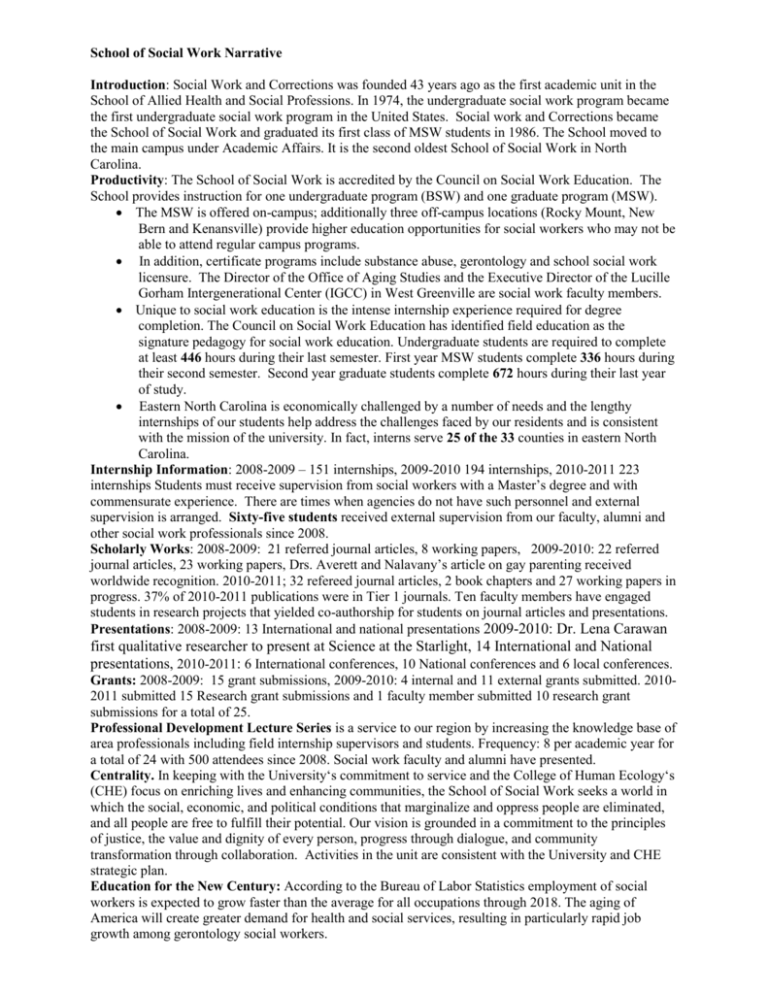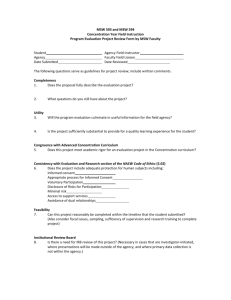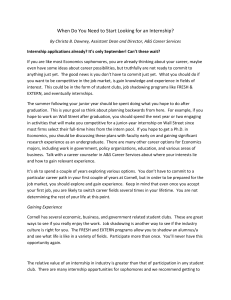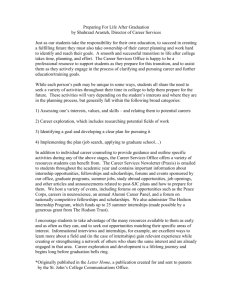School of Social Work Narrative
advertisement

School of Social Work Narrative Introduction: Social Work and Corrections was founded 43 years ago as the first academic unit in the School of Allied Health and Social Professions. In 1974, the undergraduate social work program became the first undergraduate social work program in the United States. Social work and Corrections became the School of Social Work and graduated its first class of MSW students in 1986. The School moved to the main campus under Academic Affairs. It is the second oldest School of Social Work in North Carolina. Productivity: The School of Social Work is accredited by the Council on Social Work Education. The School provides instruction for one undergraduate program (BSW) and one graduate program (MSW). The MSW is offered on-campus; additionally three off-campus locations (Rocky Mount, New Bern and Kenansville) provide higher education opportunities for social workers who may not be able to attend regular campus programs. In addition, certificate programs include substance abuse, gerontology and school social work licensure. The Director of the Office of Aging Studies and the Executive Director of the Lucille Gorham Intergenerational Center (IGCC) in West Greenville are social work faculty members. Unique to social work education is the intense internship experience required for degree completion. The Council on Social Work Education has identified field education as the signature pedagogy for social work education. Undergraduate students are required to complete at least 446 hours during their last semester. First year MSW students complete 336 hours during their second semester. Second year graduate students complete 672 hours during their last year of study. Eastern North Carolina is economically challenged by a number of needs and the lengthy internships of our students help address the challenges faced by our residents and is consistent with the mission of the university. In fact, interns serve 25 of the 33 counties in eastern North Carolina. Internship Information: 2008-2009 – 151 internships, 2009-2010 194 internships, 2010-2011 223 internships Students must receive supervision from social workers with a Master’s degree and with commensurate experience. There are times when agencies do not have such personnel and external supervision is arranged. Sixty-five students received external supervision from our faculty, alumni and other social work professionals since 2008. Scholarly Works: 2008-2009: 21 referred journal articles, 8 working papers, 2009-2010: 22 referred journal articles, 23 working papers, Drs. Averett and Nalavany’s article on gay parenting received worldwide recognition. 2010-2011; 32 refereed journal articles, 2 book chapters and 27 working papers in progress. 37% of 2010-2011 publications were in Tier 1 journals. Ten faculty members have engaged students in research projects that yielded co-authorship for students on journal articles and presentations. Presentations: 2008-2009: 13 International and national presentations 2009-2010: Dr. Lena Carawan first qualitative researcher to present at Science at the Starlight, 14 International and National presentations, 2010-2011: 6 International conferences, 10 National conferences and 6 local conferences. Grants: 2008-2009: 15 grant submissions, 2009-2010: 4 internal and 11 external grants submitted. 20102011 submitted 15 Research grant submissions and 1 faculty member submitted 10 research grant submissions for a total of 25. Professional Development Lecture Series is a service to our region by increasing the knowledge base of area professionals including field internship supervisors and students. Frequency: 8 per academic year for a total of 24 with 500 attendees since 2008. Social work faculty and alumni have presented. Centrality. In keeping with the University‘s commitment to service and the College of Human Ecology‘s (CHE) focus on enriching lives and enhancing communities, the School of Social Work seeks a world in which the social, economic, and political conditions that marginalize and oppress people are eliminated, and all people are free to fulfill their potential. Our vision is grounded in a commitment to the principles of justice, the value and dignity of every person, progress through dialogue, and community transformation through collaboration. Activities in the unit are consistent with the University and CHE strategic plan. Education for the New Century: According to the Bureau of Labor Statistics employment of social workers is expected to grow faster than the average for all occupations through 2018. The aging of America will create greater demand for health and social services, resulting in particularly rapid job growth among gerontology social workers. Online and hybrid courses are taught in addition to face-to-face. Dr. Kelly Reinsmith-Jones conducted a research pilot on the use of Second Life in an introductory social work course. Given the economy, the Saturday off-site MSW locations allow working individuals to advance their education and professional social work skills. In comparison to other schools of social work, we offer a first-of-its-kind program (clinical community/relational perspective) that sets us apart from other schools. Interdisciplinary qualitative course 7100 for Master’s and doctoral students. The Leadership University: The purposes of social work education are to prepare competent and effective professionals, to develop social work knowledge, and to provide leadership in the development of service delivery systems. Dr. Kelly Reinsmith-Jones received a $16,000 BB&T leadership grant to develop leadership courses and opportunities for students in the College of Human Ecology. She provides leadership training for social workers and was the graduation speaker for a leadership initiative at Wilson Co. Dept. of Social Services. Within 2 years of graduation, social work graduates working in rural localities are in supervisory positions. Several are county DSS Directors or Deputy Directors for the Directors in Nash, Onslow, Pitt, Washington, Wayne and Wilson County are ECU Social Work Alumni. The Cornerstone Youth Ministries Leadership Academy in Greenville, N.C is an internship site and Dr. Shelia Bunch sits on the Board of Directors. Leadership Opportunities for students: Student organizations such as the BSWSA Bachelor of Social Work Student Association, GASW-Graduate Association of Social Work, Chi Zeta Phi Alpha Social Work Honor Society all provide leadership opportunities for students. In addition, Community Show Case Forum by community practice students, representation and involvement in full faculty meetings, the social work advisory board and on the Deans Student Council. For past 2 years undergraduate social work policy students under the direction of Drs. Jackson and Miller organized a visit from U.S Rep. Walter B. Jones to present and interact with students about the political process. Health, Health Care, and Medical Innovations: Health Care agencies such as hospitals, outpatient clinics, public health, long term care facilities, home health and hospice and behavioral health agencies are used as internship sites. The School is a strong collaborator with ECU Center for Health Disparities Research. Economic prosperity in the East: MSW/LCSW graduates own private mental health agencies and employ ECU BSW and MSW alumni: for example, Eastern Psychiatric Services, Integrated Family Services, Port Human Services and Pitt Counseling. Myra Powell, ECU MSW Alum owns Vanguard, a social work temp agency which is responsible for jumpstarting the careers of new graduates. SW faculty hold Board Membership and are involved with STRIVE, a training program for the chronically unemployed, is used as an internship site The School provides skilled workers for a variety of agencies in the east. For example, 31 social work alumni work at Pitt County Dept. of Social Services and a significant number are employed with University Heath Systems and the School of Medicine. Arts, Culture and Quality of Life: Youth Arts Imitative at Emerge Gallery is used as an internship site, provides service opportunities for social work student organizations. The school has been involved since 2005 in developing and providing a community organizing internship for social work students to be placed in the land grant community of Tillery. Tillery is a mostly African American rural community with few formal resources that has a history of working for social and environmental justice. (One paper from this project is in press: August, 2010 - Averette & Carawan with others in the works). The Child Welfare Education Collaborative in the School has trained over 200 social work students who chose careers in child welfare. The lives of children and families have been impacted by exposure to skilled social workers. The IGCC provides programs (afterschool programs, youth apprenticeships, quilting circle, chess, computer training, GED, grand parenting) that improves the quality of life. Research findings from faculty research seeks to improve service provision: Drs. Carawan and Nalavany (Adults with learning disabilities), Dr. Carawan (Fishing families), Dr. Eastman (Domestic Violence; Dr. Miller (Disabilities), Dr. Averett (LGBT populations). Dr. Littlewood (Kinship Families) Dr. Yoon (Financial Empowerment) Dr. Carpenter-Aeby (Bullying in Schools: Hmong Families), Dr. Margaret Arnd-Caddigan (clinical practice) Service Directions: Social Work Faculty sit on several community boards such as Pitt County United Way, Nurse Family Partnerships, Dropout Prevention, Human Rights Committees, Boys and Girls Club Quality Accreditation by CSWE assures the School is meeting national social work educational standards and social work student-practitioner and faculty adhere to the NASW Code of Ethics. Social work is a protected title, and without a school of social work in eastern Carolina. There are a lot of jobs that would have to be filled by importing people from other parts of the state or other states. Monitoring of students in field is taken very seriously. Field students purchase malpractice insurance prior to internships, students are monitored closely during internships by agency personnel and social work faculty. Students are enrolled in a concurrent seminar during internships and their instructors visit agencies during internship to evaluate student progress. The Field Education Community Advisory Committee and the Faculty Field Committee provide advice and feedback regarding agency placements. The Office of Field Education provides training and support to agency personnel. In addition, the admissions and retention committees meet with students who are having difficulty that may jeopardize completing a successful field internship. Internships have to meet standardized guidelines via affiliation agreements that are vetted by ECU legal counsel. Ninety-five (95%) of Faculty meet or exceed the unit and university mean on SOIS scores 100% of faculty participated in online instruction training Quality of Research publications has improved: publications in Tier 1 (top 10%) has increased from 29% in 2009 to 37% in 2011. Evaluations of Field Experience spring 2011 : 100% of the students felt that the seminar instructor “helped students understand the application of classroom materials to the placement setting and were supportive of personal and professional growth.” “In this field placement, I am on the right path to becoming a successful social worker,” “The field agency experience was great: it really opened my mind to social work practice in rural areas.” Undergraduate social work assessment results indicate that 94% of students reported that being aware of their own values and beliefs was “very relevant” to becoming a competent social worker; 94% also reported that it was “very relevant” to be aware of differences between their own values and those of the Code of Ethics. During focus group sessions, students were able to clearly identify the core values of the profession and provide examples of how they had used them in their own practice during field placements. 89.4% reported that being able to set aside their own beliefs when necessary was very relevant to competent social work practice. 95.3% of students reported that both being able to respect people whose beliefs are different from their own and understanding cultural differences is “very relevant to becoming a competent social worker. Students provided numerous examples during focus group discussions of the ways in which discrimination led to social injustice for vulnerable minorities, a clear concern for the profession of social work. About 80% of respondents identified the importance of being aware of legislative policies as important to becoming a competent social worker. During the focus group sessions, students discussed the importance of understanding policies in order to effectively provide services and be successful advocates for their clients. 75.3% reported that being able to know if a method of practice is supported by research is “very relevant MSW-Data analysis shows that we are meeting our benchmark for effective student learning for the majority of our objectives: all our student response means and most faculty response means were at or above our benchmark target of 5.0 (out of a possible rank of 7 which indicates the strongest response). (SWOT) Analysis Strengths: 43 yr history at ECU, @ 4,000 alumni, History of providing advanced social work degrees in the east via off campus sites that have included Wilmington, Fayetteville, and Elizabeth City in addition to current sites. Mission and vision of the School are consistent with ECU’s mission to “serve as a national model for public service and regional transformation.” There are agencies and programs that have been able to provide services or extend services due to our student interns. Some examples are Emerge Youth Arts Initiative, Catholic Charities, Pitt county Schools Family Enrichment program, Pamlico Schools, Restart, STRIVE, Cornerstone Youth Leadership Academy, Tillery, Operation Sunshine, Greenville Community shelter, Coastal Carolina Neuro-psych Center, Palms Wellness Center. Collaborations, partnerships and Sponsorships, AMEXICAN, IGCC Lessie Bass Day NASW, Pitt Co Mental Health Association, STRIVE, Gen-Silent Documentary, Art Without Borders, Interdisciplinary Qualitative Research Course with Nurse, Community Health and Occupational Therapy Active SW Advisory Board - Planned the 42nd anniversary of the school, raised $10,000 for priority fund. Planning a second alumni event for Fall establishing the ECU School of Social Work Hall of Fame, write congratulatory notes to all graduates of the BSW/MSW programs, assists with MSW admissions process and meets once a year with faculty. Concerted effort to maintain contact with Alumni, many via field internships, FaceBook, email, Consistent donations to the Social Work Priority fund. Weakness/Challenges: Budget constraints continue to have a negative impact on the School. The inability to replace faculty members has increased the hiring of adjunct faculty and has increased the workload of current faculty Proliferation of MSW programs in the state. Currently there are 9 and 2 in candidacy. Maintain and develop quality internships especially in behavioral health to the privatization of mental health services in North Carolina. Continuous need to educate internal/external constituents about the depth and breath of the social work profession as myths and misperceptions continue to persist. Opportunities: Expand globalization opportunities for students by creating global classrooms and study abroad programs. Increase external grant funding and research opportunities for BSW and MSW students Expand and increase involvement with training students to provide services to military families Opportunity to expand gerontology given the service needs related to the aging US population Opportunity to collaborate and become involved in program development for IGCC Increase fund raising and scholarship opportunities to prospective students develop School Newsletter Threats: Decreased financial aid, increased college cost, decreased federal, state and local funds for service provision, and continued University cuts are all threats to the program.





